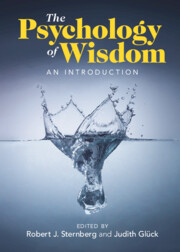Book contents
- The Psychology of Wisdom
- The Psychology of Wisdom
- Copyright page
- Contents
- Figures
- Tables
- Contributors
- Preface
- Part I Introduction to Wisdom Theory and Research
- Part II Foundations of Wisdom in the Individual and in the World
- Part III The Modifiability of Wisdom
- Chapter 11 The Development of Wisdom
- Chapter 12 Interventions for Developing Wisdom
- Part IV Wisdom in the World
- Index
- References
Chapter 11 - The Development of Wisdom
from Part III - The Modifiability of Wisdom
Published online by Cambridge University Press: 26 May 2022
- The Psychology of Wisdom
- The Psychology of Wisdom
- Copyright page
- Contents
- Figures
- Tables
- Contributors
- Preface
- Part I Introduction to Wisdom Theory and Research
- Part II Foundations of Wisdom in the Individual and in the World
- Part III The Modifiability of Wisdom
- Chapter 11 The Development of Wisdom
- Chapter 12 Interventions for Developing Wisdom
- Part IV Wisdom in the World
- Index
- References
Summary
This chapter reviews psychological theories and research about how wisdom develops. Why do some people become highly wise over time while others do not seem to gain any insights from their experiences? First, a broad developmental model of wisdom as expertise is introduced, which distinguishes between person characteristics, factors that foster the development of expertise in general, and experiential contexts that are conducive to wisdom. Then, a more specific model is described that describes five resources that help people gain wise insights from life challenges. Finally, empirical evidence on the relationship between wisdom and age is reviewed.
Keywords
- Type
- Chapter
- Information
- The Psychology of WisdomAn Introduction, pp. 175 - 192Publisher: Cambridge University PressPrint publication year: 2022
References
- 1
- Cited by



